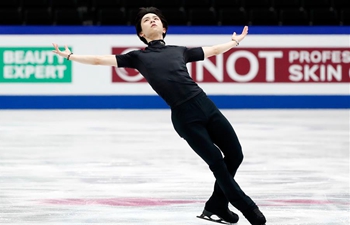By Xinhua Writers Tian Zijun, Shi Linjing and Lyu Qiuping
ZHENGZHOU, March 20 (Xinhua) -- Inside a dilapidated two-story bungalow, Chen Weiqi has been working on his latest novel by pressing his head to a keyboard in front of a flickering screen.
Chen is an amateur science fiction novelist in Xuchang, central China's Henan Province, who suffers from a severe loss of motor function due to cerebral palsy.
Over the years, the 35-year-old has mastered his own trick to work most efficiently on the computer. He would use the bulge formed by pressing the tip of his tongue against his lower lip to type, a manner that resembles a pigeon pecking at the breadcrumbs on the pavement.
Under the pen-name Tianjianglongxia, or Lobster from the Sky, Chen has created many works over the past more than 10 years, including the 225,000-word "progression of life," which was published last year.
It tells the story of a fight between human beings and monsters created by genetic technology in the year 2085.
The novel not only provides a plausible assumption on the unchecked development of life science but also warns against the catastrophic consequences of the rampant abuse of genetic technology, San Feng, a renowned science fiction researcher and critic, said in the preface.
"In the sci-fi world, I can roam freely in the realm of my untrammeled imagination, and redeem a piece of my soul from this irksome confinement I call reality," Chen said, struggling with his words and followed by a bout of involuntary tremors upon finishing each sentence.
TRAPPED INSIDE
Born in 1984, Chen suffered from a lack of oxygen at birth and was diagnosed with cerebral palsy eight months later.
Before he was five years old, he could only lean in his parents' arms.
"Unable to lift his chin, he often bumped into my cheek with his head," said Wang Xuemei, Chen's mother.
Wang named him "Weiqi," meaning “rise up,” in the hope of seeing him stand up and walk, a skill he did not master until he was six. His father died in a car accident the same year.
At the age of eight, Chen was finally admitted to a school after being turned down many times.
In Chen's own words, his primary school years were when he most felt like an ordinary child, despite being occasionally mocked for his awkward, staggered style of walking.
Despite the difficulty in holding a pen, Chen finished his homework on time every day.
"When doing homework, he would sweat all over, even in winter," Wang recalled, adding that Chen was always among the top three students in his class.
During his first year of junior high school, Chen had a high fever that lasted almost the entire summer vacation, forcing him to drop out of school as he was no longer able to get out of bed.
He had nothing to do but read while bed-ridden for the next several years.
"Reading helped me learn about the world. It made me feel better," he said.
In 2001, when he realized he could sit up again, he asked his mother to buy a computer, a luxury for most families back then.
"He seldom demanded anything. But once he decided, there was nothing that could stop him," Wang recalled, able to buy him a computer by borrowing money.
For Chen, the computer opened a door to the world wide web, where he spent most of his waking hours reading, writing and visiting online forums.
ROAMING IN IMAGINATION
In 2003, "the life of fight," a short story Chen wrote about the war between human and aliens, was published on a literature site.
"I didn't know what I wrote was called science fiction until the website editors categorized the work in the sci-fi column," he said.
Chen has consistently drawn inspiration from a variety of subjects that interest him, from books, movies, mangas or video games.
To translate his fanciful ideas into literary works as fast as he could, Chen started experimenting with different ways to type on the keyboard.
He used to rely solely on his left pinkie to do all the typing, but it could only last for about two hours before his left arm became stiff and recoiled in pain.
Plus, the posture of extending his left pinkie to the keyboard required Chen to forcibly attach his right arm on his back, thus placing an inordinate amount of pressure on his right lung and damaging its ability to function properly.
After several failed attempts at employing other functioning body parts to do the trick, Chen decided on using the bulge formed by pressing the tip of his tongue against his lower lip to type.
"If I was eager to type out my thoughts, I could type 3,000 characters a day at most, tripling my normal speed," said Chen.
Over the past 10 years, Chen has pecked nearly one million words on the keyboard. His works also won him sci-fi prizes and some remunerations.
Chen is particularly thrilled to see science fiction take off in China after Liu Cixin became the first Chinese winner of the Hugo Award for his novel “The Three-Body Problem” in 2015.
His body is continuing to deteriorate, with his lower limbs already numb, but Chen said he would never give up writing.
"Although I'm not able to leave my house, my mind can travel to the edge of the universe, and writing sci-fi has allowed me to do that," he said.

















